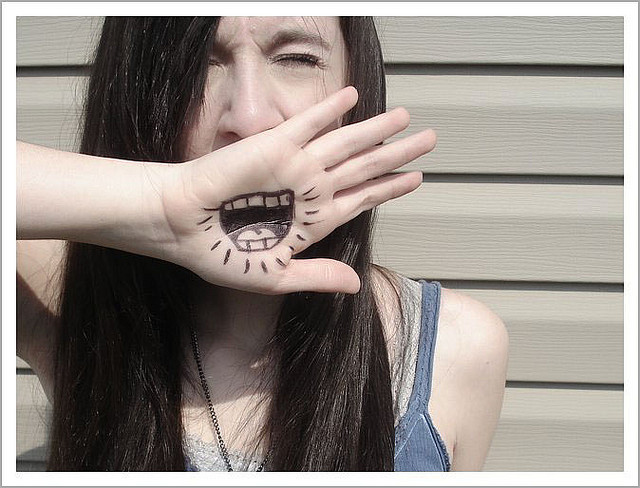by Deirdre | Jun 21, 2011 | Mindful living
Health is one of those things in life where your experience of it comes from thousands and thousands of small decisions – similar in a way to parenting. If I eat that fast-food burger, but go for a run later, do they cancel each other out? Red wine is a fantastic anti-oxidant, so more must be better, right?
 Defining “success” in health is really difficult so it falls to interpretation, personal style, level of effort, and dare I say, obsessiveness. Something shifted in the last few decades in these most fortunate of generations – the boomers and the Gen Xers. Yes, we live in a way-too-much-information world and carry a much higher chemical load, but we also worry too much about our children, what we eat and our health. Isn’t worrying really bad for your health? (more…)
Defining “success” in health is really difficult so it falls to interpretation, personal style, level of effort, and dare I say, obsessiveness. Something shifted in the last few decades in these most fortunate of generations – the boomers and the Gen Xers. Yes, we live in a way-too-much-information world and carry a much higher chemical load, but we also worry too much about our children, what we eat and our health. Isn’t worrying really bad for your health? (more…)

by Deirdre | Jun 17, 2011 | Mindful living
Integrative medicine puts the patient at the center of their health “story”. The difference between conventional medicine and integrative medicine is illuminated in the difference between treating and healing. A medical treatment plan includes the types of diagnostic testing, surgical or drug interventions and some options for self-care. An integrative plan looks at the physical, emotional, mental, social, spiritual and environmental factors that affect a person’s health. It treats each person in a holistic manner with needs of mind, body and spirit at the heart of the plan.
The Bravewell Collaborative is a force to be reckoned with in this area. A philanthropic organization, they live and breathe to stimulate a widespread conversation about prevention and patient-centered care – and the public-private collaborations that will make that a reality. To quote a leading proponent of integrative healthcare: “They passionately want medicine to return to its soul, the altruistic call to service that treats the whole person in the context of one’s community”. (more…)

by Deirdre | May 18, 2011 | Resilient Mindset
This being human is a guest house. Every morning a new arrival. – Rumi
You’re excited about a new direction for yourself – improve your health, get better sleep, look for a job that is more in line with your evolving self, figure out what foods really work for your body. This idea is lighting up your life. You’re ready to put in the work to align the outsides of your life to a new awakening that is coming from within.
But put a toe on the start line and there’s this voice that pops up in your head, reminding you of how you’ve tried this before, how it didn’t work then and how it won’t work now. The voice can be nasty or sometimes it’s oh, so concerned, but it’s still telling you that you’re not capable of this job.
Hello, Inner Critic
What you’ve done is awoken and frightened your inner critic – that protective voice that rings from the past.
Its self-appointed job is to keep everything steady. It wants to keep you from changing. It doesn’t want you to get hurt, or embarrass yourself, or feel like a failure.
Living in harmony with your inner critic means something uncomfortable. To disarm your inner critic you have to embrace it first. To see where it protects you. Then you will gain clarity to see where you have grown and it hasn’t.
So Persuasive
Your inner critic has been with you for so long that it sounds just like the voice of reason. It lives to point out all the hills you’ll have to climb and the dangers you’ll fall prey to. The voice distracts you with its chatter and exhausts you with its circular logic. The voice isn’t seeing something important though. That’s the experience you’ve had and how you’ve succeeded. It also doesn’t get that today is a different day.
One of the reasons we’re so drawn to small children and animals is that they don’t have that inner critic running the show. They are instinctive and in the moment and they allow us a few moments of grace if we are able to join them in their world.
Tilda Keeps Me Company
My inner critic is Tilda Time-keeper, always sure that whatever I’m doing is not the exact right thing. She’s sure I’m not doing it fast enough, either. Tilda has many strong points and certainly moves things along – the only problem is that she often has no idea where she’s going. She’s briskly efficient – kind of like those interior designers on HGTV who breeze into a place, fire off a number of ideas and orders, buy some lovely pieces and then wave goodbye to the adoring home owners.
Unlike those successful designers, my Tilda often has no idea about how it’s going to look at the end. She’s harried and anxious because she is making her decisions based on fear. She’s always trying to prevent bad things from happening – not trying to create good things. So when Tilda starts agitating I know it’s time to sit quietly and revisit my vision for the future. Then I put together a timeline and list of chores for Tilda to cross off every day. She’s thrilled that someone has FINALLY started paying attention to the bigger picture and she’s off doing what she does best.
Who’s Your Inner Critic?
So how do you recognize your inner critic? It’s the inner voice of your fear.
Sometimes it’s the voice of someone in your life who was really hard to please. Your inner critic take something unkind or thoughtless they said and replays it whenever you are near the edge of your comfort zone. They were probably looking to keep you safe too, but it came out sounding like a criticism. Or it was something said along the way to keep them safe. Your inner critic puts it on continuous loop.
How do you disarm your inner critic? Mindfulness. Become aware of that voice and those relationships. Observe the voice, how you feel when it speaks, and think about whether it’s advising in your best interests. Embrace it for how it protects you. Maybe it needs a little space to grow too.
Posted by Deirdre Walsh
Image: Mouthing Off by Demi-Brooke under Creative Commons 2.0
If you enjoyed this post, please share it with your friends!

by Deirdre | Apr 22, 2011 | Mindful living, Resilient Mindset
A kind friend (and lovely soul) sent me a poem this week on how illness and suffering can help us remember our best self – our compassionate, patient and accepting self. Illness is never a welcome guest. It throws our daily lives into chaos and forces us to strip away the fluff. But we have so much time and energy invested in the fluff that its removal adds yet another layer of anguish to our days. All the things we should be doing . . . What will I miss? What will I lose?
Illness offers us a time to re-evaluate our lives and to grapple with some of the deeper human issues we skate over in our daily life. How each person grapples with the questions and searches for answers is as unique . . . as each person. There are those, like author Toni Bernhard, who see a path to spiritual grace inherent in illness. They see the chance to transcend illness and find meaning and connection and to appreciate the moments of grace and healing.
Others find that perspective a crock. The idea that illness has special powers to teach and transform is an offensive and distressing burden to place on someone who is already at the edge of coping. As Jessie Gruman, a physician who writes about her experience with cancer, says: “If I do not find spiritual or philosophical benefit, I fall short: Either I haven’t tried hard enough or I’m not smart enough to do so.”
Most of us, luckily, are able to stay far, far away from this inquiry. But for those who want to wade in, Havi Carel wrote a very readable, and short, philosophical treatment of the experience of illness. She argues that medicine (and, indeed, everyone) needs to take into account what it is like, moment to moment, day to day, for a patient to live their life within illness. She writes about the social life of illness and finding health within illness. Her account is personal, as she struggles with a life-threatening disease, and graceful.
Prayer for Healing after Pain
O God our undying hope, we thank you for the warmth which steals back
into our hearts after a while; for the healing which comes to wounded
bodies and spirits through time;
for the blessed fact that the flood of pain does not last forever, and for the
incredible bliss when the tide begins to ebb;
for the cheerfulness which breaks into our dark dungeon and strikes off our
fetters when least expected, we know not how;
for the strange sadness which haunts our brightest hours because our hearts
are made for a joy deeper than happiness;
for the insurgent courage which lifts its head above past mistakes and woes,
and affirms its right to try again;
for the way in which old quarrels often become forgetful, and afford us the
opportunity of being calm and compassionate;
for the golden thread of valor and good will never quite lost in the tragic
wanderings of peoples and nations;
for the labors of those who have sown that others may reap;
for the dear kindness of those who see us as we once were.
We thank you, God of our little faith, our greater hope, and above all our
faltering love, which can never fail because it is more yours than ours,
Vivian Pomeroy (1883-1961) from New Prayers in Old Places
Posted by Deirdre Walsh
Image: Death to Stock
If you enjoyed this post, please share it with your friends!
by Deirdre | Apr 14, 2011 | Mindful living
 You know the ones I mean – those fantastic before and after shots. The one where the person starts out looking like they’ve eaten at one too many buffets and watched one too many reruns of The Real Housewives. Then in some incredible period of time – like six weeks – they’re as sleek and toned as any Hollywood star and taking calls for their own reality show. We all get sucked in to the promise of that kind of miraculous transformation in our lives.
You know the ones I mean – those fantastic before and after shots. The one where the person starts out looking like they’ve eaten at one too many buffets and watched one too many reruns of The Real Housewives. Then in some incredible period of time – like six weeks – they’re as sleek and toned as any Hollywood star and taking calls for their own reality show. We all get sucked in to the promise of that kind of miraculous transformation in our lives.
The good news – that kind of transformation is possible. (more…)
 Defining “success” in health is really difficult so it falls to interpretation, personal style, level of effort, and dare I say, obsessiveness. Something shifted in the last few decades in these most fortunate of generations – the boomers and the Gen Xers. Yes, we live in a way-too-much-information world and carry a much higher chemical load, but we also worry too much about our children, what we eat and our health. Isn’t worrying really bad for your health? (more…)
Defining “success” in health is really difficult so it falls to interpretation, personal style, level of effort, and dare I say, obsessiveness. Something shifted in the last few decades in these most fortunate of generations – the boomers and the Gen Xers. Yes, we live in a way-too-much-information world and carry a much higher chemical load, but we also worry too much about our children, what we eat and our health. Isn’t worrying really bad for your health? (more…)



